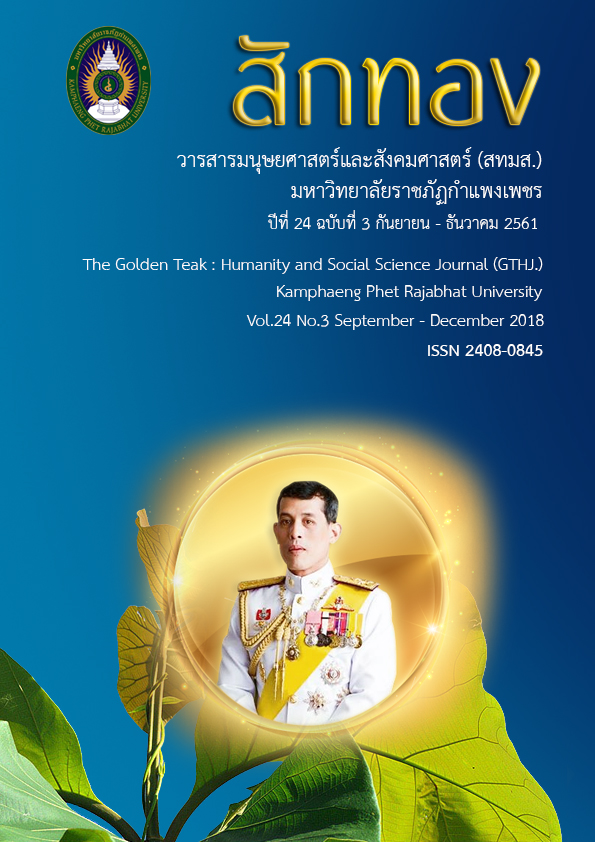Confirmatory Factor Analysis of Positive Psychological Capital of Higher Education Students
Main Article Content
Abstract
The purposes of this research were 1. to carry out the confirmatory factor analysis of Positive Psychological Capital of higher education students, and 2. to test the consistency of the Positive Psychological Capital of higher education students. The samples of this research were 580 first year students from Khon Kaen University, Nakhon Phanom University, Sakon Nakhon Rajabhat University, and Sisaket Rajabhat University. The Multi–Stage Random Sampling technique was used in this study. The research instruments were the Positive Psychological Capital scale confirmatory factor analysis and the consistent test of the Positive Psychological Capital by using Mplus 6.12. The results revealed that 1) the factors of Positive Psychological Capital of higher education students consisted of 4 factors according to priority of factor loading as following : Resilience (0.973), Hope (0.914), Optimistic (0.744) and Self-Efficacy (0.737). 2) The consistency of the Positive Psychological Capital of higher education students found that the constructive validity of scale and the model fitted well and the empirical data ( = 61.933, df= 31, P-Value= 0.0008 ,TLI= 0.969, CFI= 0.979 , SRMR= 0.035, RMSEA= 0.041) and the factor loading of those 4 components were statistical significant at 0.01 levels.
Article Details
บทความที่ได้รับการตีพิมพ์เป็นลิขสิทธิ์ของวารสาร สักทอง : วารสารมนุษยศาสตร์และสังคมศาสตร์ สถาบันวิจัยและพัฒนา มหาวิทยาลับราชภัฏกำแพงเพชร
ข้อคิดเห็นใดๆ ที่ปรากฎในวารสารเป็นวรรณกรรมของผู้เขียนโดยเฉพาะ ซึ่งมหาวิทยาลัยราชภัฏกำแพงเพชรและบรรณาธิการไม่จำเป็นต้องเห็นด้วย
References
Byrne, B. (1998). Structural Equation Modeling with Mplus. London : Taylor and Francis Group.
Chadcham, S. (2004). Confirmatory Factor Analysis. Journal of Educational Research and Measurement, 2(1), 15-42.
Damrongpanit, S. (2012). MPLUS Program and Behavioral and Social Sciences Data Analysis. Mahasarakham : Mahasarakham University.
Fredrickson, B.L., et al. (2003). What good are positive emotions in crises? A prospective study of resilience and emotions following the terrorist attacks on the united states on September 11th, 2001. Journal of Personality and Social Psychology, 84(2), 365-376.
Hair, J.F., et al. (2010). Multivariate Data Analysis: A Global Perspective. (7 th ed.). Upper Saddle River : Pearson Prentice Hall.
Herth, K.A. ( 1990). Fostering hope in the terminally ill. Nursing Science Quarterly, 4(3), 177-184.
Hu, L.T. & Bentler, P.M. (1999). Cutoff criteria for fit indexes in covariance structure analysis : Conventional criteria versus new alternatives. Structural Equation Modeling, 6(1), 1-55.
Luthans., et al. (2007). Psychological Capital. New York : Oxford University Press.
Mangrulkar, L., et al. (2001). Life Skills Approach to Child and Adolescent Health Human Development. Washington, DC : Education Development Center.
Nelson-Jones, R. (1992). Group Leadership : A Training Approach. California : Brook/Cole.
Nelson, D.L & Cooper, C.L. (2007). Positive organizational behavior. London : Sage Publications.
Office of the Higher Education Commission. (2015). The Higher Education Statistics. [Online]. Available : http://www.mua.go.th. [2015, January 3].
Office of the National Economics and Social Development Board. (2010). The National Social and Economic Development Plan, No. 12 (2017-2021). Bangkok : Sahamitr Printing and Publishing.
Office of the National Education Commission. (2002). National Education Act B.E. 2542 (1999) and Amendments (Second National Education Act B.E. 2545 (2002)) and (No.3) 2553 (2010). Bangkok : Prikwarn-graphic.
Ruangkanchanasetr, S. (2008). Teen Health Promotion Strategy. Bangkok : Chaicharoen.
Shahnawaz, M.G., & Jafri, M.H. (2009). Psychological capital as predictors of organizational commitment and organizational citizenship behaviour. Journal of
the Indian Academy of Applied Psychology, 35, 78-84.
Snyder, C.R. & Lopez, S. (2002). Handbook to Positive Psychology. Oxford, UK : Oxford University Press.
Snyder, C.R. & Lopez, S. (2007). Positive Psychology : The Scientific and Practical Exploration of Human Strengths. London : Sage Publications.
Steiger, J.H. (2007). Understanding the limitations of global fit assessment in structural equation modeling, Personality and Individual Differences, 42(5), 893-898.
Steinberg,L. (1993). Adolescence. (3 rd ed.). New York : McGraw-Hill.
Tuntatead, H., et al. (2014). The Development of Thai-Psychology Capital Inventory. Journal of the Psychiatric Association of Thailand, 59(1), 73-82.
Wiratchai, N. (2012, January-June). Confirmatory Factor Analysis. Journal of Research and Curriculum Development, 2(1), 68-74.


